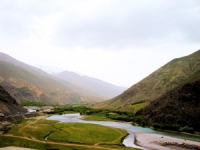Water sharing between Central Asian countries has been conflicting for quite a long time already.
Tajikistan stopped selling the Rogun HEP shares

The sale of Rogun HEP shares has been stopped: not a single company share has been sold in 2012, Asia Plus reported on 19 November citing Tajikistan’s Ministry of Finance.
After consolidating the company’s inventory, which is held in the eight Tajik banks which were attempting to sell the shares, the company’s management found out that the sum gained from selling shares in previous years has not changed and remains 804.7 million somoni (around $170 million).
Since 6 January 2010, when the sale of shares in Rogun HEP began in Tajikistan, just over 1.8 million shares have been sold out of a total of 5 million, thus leaving more than 3 million shares facing no demand.
Eight Tajik banks were responsible for carrying out this Tajik government initiative. Rogun HEP shares were available for 100, 500, 1,000 and 5,000 somoni. Certificates for more than 5,000 somoni are registered shares.
The campaign to sell Rogun HEP shares began after Tajikistan failed to get financing to build a strategic hydroelectric power-station, which the republic hopes will rid it from an acute energy crisis and take it to a new level of economic achievements.
The country’s entire population was involved in the campaign on a voluntary-compulsory basis. “Pensioners lost around 50 percent of their pension savings. Even school children, under age kids were asked for money for shares. The local authorities made these demands, using threats to fire people from their jobs”, a Fergana source in Tajikistan said at the time.
The noise around the Rogun HEP share sale quietened at the end of 2010.
Construction to add to the Rogun HEP began in September 2007. The Tajik government decreed that the construction of the power-station will be funded by deposits made by the country’s citizens. According to a draft, the 6 hectare Rogun HEP site is capable of producing 3.6 million kilowatt hours of electro-energy. However, neighboring Uzbekistan is actively opposing the construction, with the Uzbek president predicting rising tensions in the Central Asian region and does not exclude war as a possibility.




